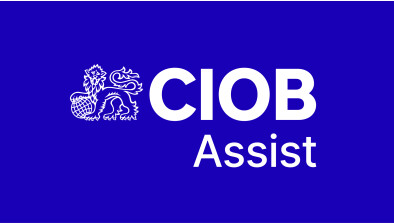Dr Scott McGibbon: Advancing Silica Dust Awareness for residents, clients & construction excellence through targeted toolkit
Dr Scott McGibbon
Dr Scott McGibbon FCIOB is a chartered construction manager from Kirkcaldy who started his construction career as a stonemason. He rose the industry ranks to become managing director of his own Fife-based construction company, Pvotal Consultancy, covering Scotland as well as UK and international projects. McGibbon became the first beneficiary of the Paul Dockerill Award, a fund set up by the Chartered Institute of Building (CIOB) in memory of one its former trustees.
I am extremely honoured and grateful to become the first recipient of the Paul Dockerill Award, a CIOB initiative set up in memory of its namesake, who sadly died in 2022.
The funding will go a long way toward supporting an extremely pressing research venture – REACT.
Having worked in construction and the built environment for almost 40 years now, as an apprentice stonemason, qualified craftsman, project manager and micro-SME business owner – my new goal is to pave the way for a safer and healthier future in built environment projects.
I’ll do this by developing a practical and pragmatic silica dust awareness toolbox designed specifically for residents, clients and the construction workforce (professionals and contractors).
For anyone who is not already aware, silica dust is a natural substance found in various construction materials like sandstone, asphalt, brick, cement and concrete.
Research shows approximately 2.3 million workers worldwide are exposed to silica dust every year. It is the second biggest risk to construction workers after asbestos and prolonged exposure to respirable crystalline silica (RCS) risks serious health issues, resulting in a range of debilitating diseases and injuries.
Speaking personally, I have seen first-hand the tragic, devastating effects of this life-threatening substance, both to those who contract illnesses because of exposure and of course the long-term impacts on their families and friends.
Why a targeted toolkit for Residents, Clients & Construction professionals?
You might wonder why this project is so crucial. The answer lies in that numerous public health, governmental and industry organisations are reporting silica dust exposure and its impacts as a quickly emerging global crisis.
Recent research by IOSH revealed around 48,000 deaths worldwide per year are caused by direct exposure to silica dust at work and many more people are left fighting for breath.
To give you a number which is a little closer to home, around 600 construction workers in the UK die from silica exposure every year.
This is despite the risks of silica dust being known for thousands of years, the impact of high exposure being irreversible, and mitigation being relatively straightforward.
Adding to these frightening statistics, prolonged exposure to RCS dust can lead to serious health issues, resulting in a range of debilitating diseases and injuries as well as a collection of autoimmune, cardiovascular, renal and cancer diseases.
So, that’s direct exposure, but what about those who could be affected by indirect exposure? For example, loved ones who work in silica dust environments and are bringing home the microscopic granules embedded in their clothing and then contaminating the home environment and potentially family members.
Keeping dusty work clothes at home can increase exposure and risk of silicosis by as much as 10 per cent.
The Potential of a Targeted Silica Dust Toolkit
Having a resident, client & construction professional silica dust toolkit offers the opportunity to be a catalyst for raising resident and client awareness. It will also improve knowledge of silica dust dangers, the impact it has and offer mitigation strategies for anyone who is undertaking construction work.
Whilst, for construction professionals, it has significant potential to improve workplace safety given the widespread acknowledgement of the urgent need for increased management of construction health and safety practices.
Especially given, in a 2023 report, the All-Party Parliamentary Group for Respiratory Health (APPG) highlighted there is a lack of standardised mandatory silica dust risk exposure and control training components within all UK and EU Further and Higher Education (FE/HE) built environment and construction related courses, programmes, modules, and apprenticeship schemes (foundation, modern and graduate).
The Residents, Clients & Construction Excellence Toolkit (REACT) Solution
The REACT solution is designed to bridge the knowledge gap in the field. This project consists of four primary objectives.
Firstly, I will conduct an in-depth investigation into current resources for ‘best practice’ monitoring and controlling RCS dust, in correlation with exploring the current level of awareness/understanding/skills of residents, clients & the construction workforce to establish a solid foundation.
Secondly, I aim to design, develop and create the REACT toolkit to reflect an industry commitment to caring for both clients and residents through high standards in construction health and safety practices.
I am committed to assessing the effectiveness and efficacy of the REACT toolkit, among the groups targeted, ensuring it serves its purpose optimally by evaluating and validating the toolkit through a series of small-scale trials /workshop demonstrations and deployment.
Finally, my journey will culminate in the publication of a journal article sharing my insights, findings, and knowledge with the broader academic and professional community.
My commitment is to help reshape the future of construction health and safety practice, reduce barriers for the public to intervene when poor practice is witnessed, and ultimately foster more collaborative practices.
Too many deaths occur both in the UK and the wider world due to the lack of awareness about the danger silica dust poses – something I hope this potentially life-saving toolkit will help prevent.














